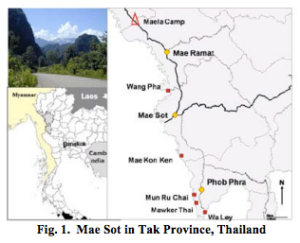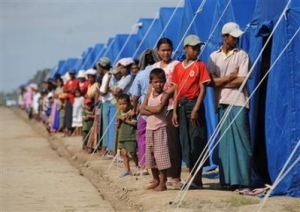I believe Gender Assessment of ICT Usage and Access in Africa does an excellent job highlighting the complications of dispersing ICT access equally across rural and urban areas of developing countries. By breaking ICT down to specific categories, including radio, internet and cell phone access, the report gives the clear understanding of the complications, emphasizing the role of women, in and out of the house, and how and when they are most commonly able to access ICTs. Just as women of rural lands are marginalized in this report, I chose to look further into marginalized populations and their access to ICTs. I came across a report entitled ICT’s and it’s Social Meanings: Women in the Margins of Thailand. This report, published in December 2010 by Mary Luz Menguita-Feranil focuses on the social implications of ICTs for marginalized women in the Thailand-Burma border. (see map below)
 These implications have grown from globalization and technological change, and most widely effect the growth and transformation of the local economy. The report finds that while this globalization of ICT usage has helped the economies of most developed countries, a major urban-rural divided persists in developing countries such as Thailand (similar to what was found in the first article mentioned) and that a notable implication of this divide majorly affects the marginalized women, the migrant workers and refugees, in Thailand, especially in the context of community empowerment. These refugees and migrant workers are in an attempt to escape the repressive militant government of Burma. The role of ICTs has been great. They have enabled significant growth and survival of the freedom of information, communication, and mobility that were not allowed to the women within their own country. Essentially the new perspective this paper was able to bring to my attention was the ability of ICTs to keep refugees connected. Not with the outside world, but with their old life. The refugees are now able to stay connected with their family at home, amplify their voice and their need, and continue to enable a knowledge society where women can expand and learn. Unfortunately, a large group of women, in Thailand, and around the globe, are still excluded from these benefits. The exclusions include the illiterate, those in particular rigid religious households, and those who cannot afford the technology. However, hope is seen in the changes this access has granted to the refugees, and the ability it has given them to hold onto a normal life with opportunity.
These implications have grown from globalization and technological change, and most widely effect the growth and transformation of the local economy. The report finds that while this globalization of ICT usage has helped the economies of most developed countries, a major urban-rural divided persists in developing countries such as Thailand (similar to what was found in the first article mentioned) and that a notable implication of this divide majorly affects the marginalized women, the migrant workers and refugees, in Thailand, especially in the context of community empowerment. These refugees and migrant workers are in an attempt to escape the repressive militant government of Burma. The role of ICTs has been great. They have enabled significant growth and survival of the freedom of information, communication, and mobility that were not allowed to the women within their own country. Essentially the new perspective this paper was able to bring to my attention was the ability of ICTs to keep refugees connected. Not with the outside world, but with their old life. The refugees are now able to stay connected with their family at home, amplify their voice and their need, and continue to enable a knowledge society where women can expand and learn. Unfortunately, a large group of women, in Thailand, and around the globe, are still excluded from these benefits. The exclusions include the illiterate, those in particular rigid religious households, and those who cannot afford the technology. However, hope is seen in the changes this access has granted to the refugees, and the ability it has given them to hold onto a normal life with opportunity. 